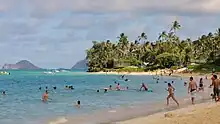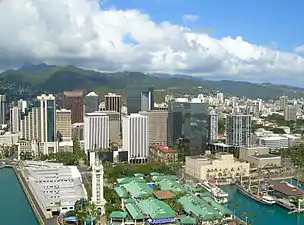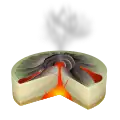Nickname: Gathering Place | |
|---|---|
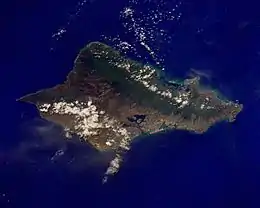 Oblique satellite photo of Oʻahu | |
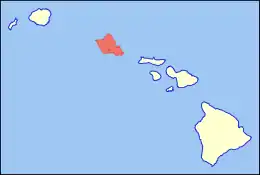 | |
| Geography | |
| Location | 21°30′N 158°00′W / 21.5°N 158.0°W |
| Area | 596.7 sq mi (1,545 km2) |
| Area rank | 3rd largest Hawaiian Island |
| Highest elevation | 4,025 ft (1226.8 m) |
| Highest point | Kaʻala |
| Administration | |
United States | |
| Symbols | |
| Flower | ʻilima |
| Color | Melemele (yellow) |
| Largest settlement | Honolulu |
| Demographics | |
| Population | 1,016,508 (2020) |
| Pop. density | 1,704/sq mi (657.9/km2) |
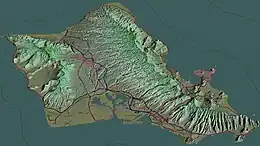
Oahu (/oʊˈɑːhuː/) (Hawaiian: Oʻahu (pronounced [oˈʔɐhu])) is the third-largest of the Hawaiian Islands.[1] The island of Oʻahu and the Northwestern Hawaiian Islands constitute the City and County of Honolulu. The state capital, Honolulu, is on Oʻahu's southeast coast. Oʻahu has a population of 995,638,[2] up from 953,207 in 2010 (approximately 70% of the total 1,455,271 population of the U.S. state of Hawaii,[3] with approximately 81% of those living in or near the Honolulu urban area).
Name
The Island of Oʻahu in Hawaii is often nicknamed, (or translated as) "The Gathering Place". The translation of "gathering place" was suggested as recently as 1922 by Hawaiian Almanac author Thomas Thrum. It has been speculated that Thrum ignored or misplaced the ʻokina because the Hawaiian phrase "ʻo ahu" could be translated as "gathering of objects" (ʻo is a subject marker and ahu means "to gather"). The term Oʻahu has no confirmed meaning in Hawaiian, other than that of the place itself.[4][5]
History
.jpg.webp)

The island has been inhabited since at least the 3rd century A.D.[6] The 304-year-old Kingdom of Oʻahu was once ruled by the most ancient aliʻi in all of the Hawaiian Islands. The first great king of Oʻahu was Maʻilikūkahi, the lawmaker, who was followed by many generations of monarchs. Kualiʻi was the first of the warlike kings and was succeeded by his sons. In 1773, the throne fell upon Kahahana, the son of Elani of Ewa. In 1783, Kahekili II, King of Maui, conquered Oʻahu, deposed the reigning family, and made his son, Kalanikūpule, king of Oʻahu, turning Oʻahu into a puppet state. Kamehameha the Great conquered Kalanikūpule's forces in the Battle of Nuʻuanu. Kamehameha founded the Kingdom of Hawaiʻi with the conquest of Oʻahu in 1795. Hawaiʻi was not unified until the islands of Kauaʻi and Niʻihau surrendered under King Kaumualiʻi in 1810. Kamehameha III moved his capital from Lāhainā, Maui to Honolulu, Oʻahu in 1845. ʻIolani Palace, built later by other members of the royal family, still stands, and is the only royal palace on American soil.
Oʻahu was apparently the first of the Hawaiian Islands sighted by the crew of HMS Resolution on January 19, 1778, during Captain James Cook's third Pacific expedition. Escorted by HMS Discovery, the expedition was surprised to find high islands this far north in the central Pacific. Oʻahu was not actually visited by Europeans until February 28, 1779, when Captain Charles Clerke aboard HMS Resolution stepped ashore at Waimea Bay. Clerke took command of the ship after James Cook was killed at Kealakekua Bay (island of Hawaiʻi) on February 14, and was leaving the islands for the North Pacific. With the discovery of the Hawaiian Islands came the introduction of disease, mosquitoes, and aggressive foreign animals. Although indirect, simple exposure to these foreign species caused permanent damage to the Native Hawaiian people and environment.
The Imperial Japanese Navy's attack on Pearl Harbor, Oʻahu on the morning of December 7, 1941, brought the United States into World War II. The surprise attack was aimed at destroying the American will to fight and making them sue for peace immediately by attacking the Pacific Fleet of the United States Navy and its defending Army Air Forces and Marine Air Forces. The attack damaged or destroyed 12 American warships, destroyed 188 aircraft, and resulted in the deaths of 2,335 American servicemen and 68 civilians (of those, 1,177 were the result of the destruction of the USS Arizona alone).[7][8]
Today, Oʻahu has become a tourism and shopping haven. Over five million visitors (mainly from the contiguous United States and Japan) flock there every year.[9]
Climate
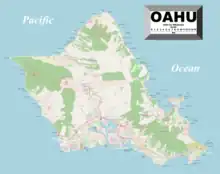
| ||||||||||||||||||||||||||||||||||||||||||||||||||||||||||||||||||||||||||||||||||||||||||||||||||||||||||||||||||||||||||||
Oʻahu is also known for having the longest rain shower in history, which lasted 200 consecutive days. Kāneʻohe Ranch reported 247 straight days of rain from August 27, 1993, to April 30, 1994. The average temperature in Oʻahu is around 70–85 °F (21–29 °C). The island is the warmest from June through October. The winter is cooler, but still warm, with an average temperature of 68–78 °F (20–26 °C).
Geography
Oʻahu is 44 miles (71 km) long and 30 miles (48 km) across. Its shoreline is 227 miles (365 km) long. Including small associated islands such as Ford Island plus those in Kāneʻohe Bay and off the eastern (windward) coast, its area is 596.7 square miles (1,545.4 km2), making it the 20th-largest island in the United States.[11]
The city of Honolulu—the state's capital and largest city is located on the island. As a jurisdictional unit, all of Oʻahu is in Honolulu County, although Honolulu occupies only part of its southeastern end.
Well-known features of Oʻahu include Waikiki, Pearl Harbor, Diamond Head, Hanauma, Kāneʻohe Bay, Kailua Bay, North Shore, and the resort destination Ko Olina.
The island is composed of two separate shield volcanoes: the Waiʻanae and Koʻolau Ranges, with a broad valley or saddle (the central Oʻahu Plain) between them. The highest point is Kaʻala in the Waiʻanae Range, rising to 4,003 feet (1,220 m) above sea level.[12]
Tourism


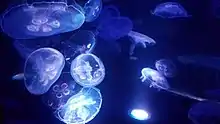
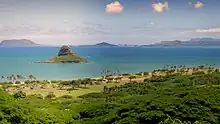

Oahu, along with the rest of the State of Hawaii, relies on tourism as a driving force of the local economy.[13] Popular tourists attractions include various beaches around the island such as Ala Moana Beach, Hanauma Bay, Kāneʻohe Bay, Ko Olina Beach Park, Waikīkī Beach, among others. Other tourist attractions include Ala Moana Center, Bishop Museum, the Honolulu Museum of Art, ʻIolani Palace, and Kualoa Ranch.


Notable people
- Barack Obama, 44th President of the United States
- Benny Agbayani, professional baseball player
- Keiko Agena, actor
- Gabe Baltazar, clarinet and saxophone player
- Alexandria Boehm, scientist
- Darin Brooks, actor, writer, producer
- Max Holloway, MMA Fighter, Former UFC Featherweight Champion
- Angelique Cabral, actor
- Tia Carrere, actor
- Brian Ching, Major League Soccer
- Dennis Chun, actor (Hawaii Five-0), son of Kam Fong
- Bryan Clay, Olympic decathlete 2008
- Scott Crary, film director and producer
- Auliʻi Cravalho, actor, singer
- Mark Dacascos, actor
- Caitlin Doughty, mortician, author and YouTube personality
- Diana Ewing, actor
- Sid Fernandez, baseball
- Maile Flanagan, actor
- Kam Fong, actor
- Lauren Graham, actor
- Erin Gray, actor
- Brian Grazer, Oscar-winning film and television producer
- Coco Ho, pro surfer
- Don Ho, singer
- Kelly Ann Hu, actor
- Carrie Ann Inaba, dancer, actor, musician
- Daniel Inouye, US Senator, Medal of Honor recipient
- Jack Johnson, musician, folk-rock singer-songwriter
- Duke Kahanamoku, pro swimmer, surfer, sheriff
- Samuel Kamakau, historian
- Israel Kamakawiwo'ole, musician
- Maxim Knight, actor
- Olin Kreutz, football player Chicago Bears
- Clyde Kusatsu, actor
- Brook Lee, model and co-host of television talk show "It's a Hawaii Thing" on OC 16
- Teri Ann Linn, actor
- Jack Lord, actor
- Marcus Mariota, NFL football player, Philadelphia Eagles
- Markiplier (Mark Edward Fischbach), Internet personality, video game commentator
- Bruno Mars, singer-songwriter, record producer, musician
- Julie McCullough, actor
- Zack Merrick, drummer in American rock band All Time Low
- Bette Midler, singer, actor, comedian
- Jason Momoa, actor
- Carissa Moore, pro surfer, olympian
- Tahj Mowry, actor
- Don Muraco, professional wrestler
- Jamie O'Brien, surfer
- Ellison Onizuka, NASA astronaut, STS-51-C, STS-51-L, Space Shuttle Challenger disaster
- Noelani Pantastico, ballet dancer
- Janel Parrish, actor, singer
- Kelly Preston, actor
- Maggie Q, actor
- Jonah Ray, actor, comedian, writer
- Makua Rothman (born 1984), world champion surfer
- Anthony Ruivivar, actor
- Jesse Sapolu, retired football player, San Francisco 49ers
- Garret T. Sato, actor
- Amanda Schull, actor
- John John Florence, professional surfer
- James Shigeta, actor
- Jake Shimabukuro, ʻukulele player
- Karen Steele, actor
- Don Stroud, actor
- Tua Tagovailoa, NFL football player, Miami Dolphins
- Ronald Takaki, academic, historian, ethnographer, and author
- Akebono Tarō, sumo wrestler
- Kristi Tauti, professional figure competitor and fitness model
- Manti Te'o, NFL football player, Los Angeles Chargers
- Paul Theroux, author
- Michelle Wie West, golf LPGA
- Taylor Wily, actor
- Kirby Wright, poet and writer
- Keone Young, actor
See also
References
Citations
- ↑ Nichols, William D.; Shade, Patricia J.; Hunt, Charles D. (1996). Professional Paper (Report). doi:10.3133/pp1412a. hdl:2027/mdp.39015040694906.
- ↑ "US Census Bureau". Archived from the original on October 24, 2021. Retrieved December 9, 2021.
- ↑ "US Census Bureau". census.gov.
- ↑ Pukui, et al., 1976
- ↑ Pukui, Mary Kawena (December 1976). Place Names of Hawaii. University of Hawaii Press. ISBN 0-8248-0524-0.
- ↑ Van, James (2010). Ancient Sites of Oahu: A Guide to Archaeological Places of Interest. Bishop Museum Pr. Page 5. ISBN 978-1581780956.
- ↑ https://www.census.gov/history/pdf/pearl-harbor-fact-sheet-1.pdf
- ↑ "The Pearl Harbor Attack, 7 December 1941 - Overview". public1.nhhcaws.local. Retrieved November 30, 2023.
- ↑ https://files.hawaii.gov/dbedt/visitor/dims/2023%20YTD%20Visitors%20by%20Country%20by%20Month%20by%20MMA.pdf
- ↑ "NASA Earth Observations Data Set Index". NASA. Archived from the original on August 6, 2013. Retrieved January 30, 2016.
- ↑ "Table 5.08 – Land Area of Islands: 2000" (PDF). State of Hawaii. 2004. Archived from the original (PDF) on March 9, 2013. Retrieved July 23, 2007.
- ↑ "Table 5.11 – Elevations of Major Summits" (PDF). State of Hawaii. 2004. Archived from the original (PDF) on March 9, 2013. Retrieved July 23, 2007.
- ↑ Hawaii Tourism Authority (2019, December). "Fact Sheet: Benefits of Hawai‘i's Tourism Economy". Honolulu.
Sources
- Doyle, David W., 2001. Rescue in Paradise: Oahu's Beaches and their Guardians. Island Heritage.
- Macdonald, Gordon A., Agatin T. Abbott, and Frank L. Peterson, 1983. Volcanoes in the Sea. University of Hawaiʻi Press, Honolulu. 517 pp.
- Pukui, M. K., S. H. Elbert, and E. T. Mookini, 1976. Place names of Hawaiʻi. University of Hawaiʻi Press. 289 pp.
